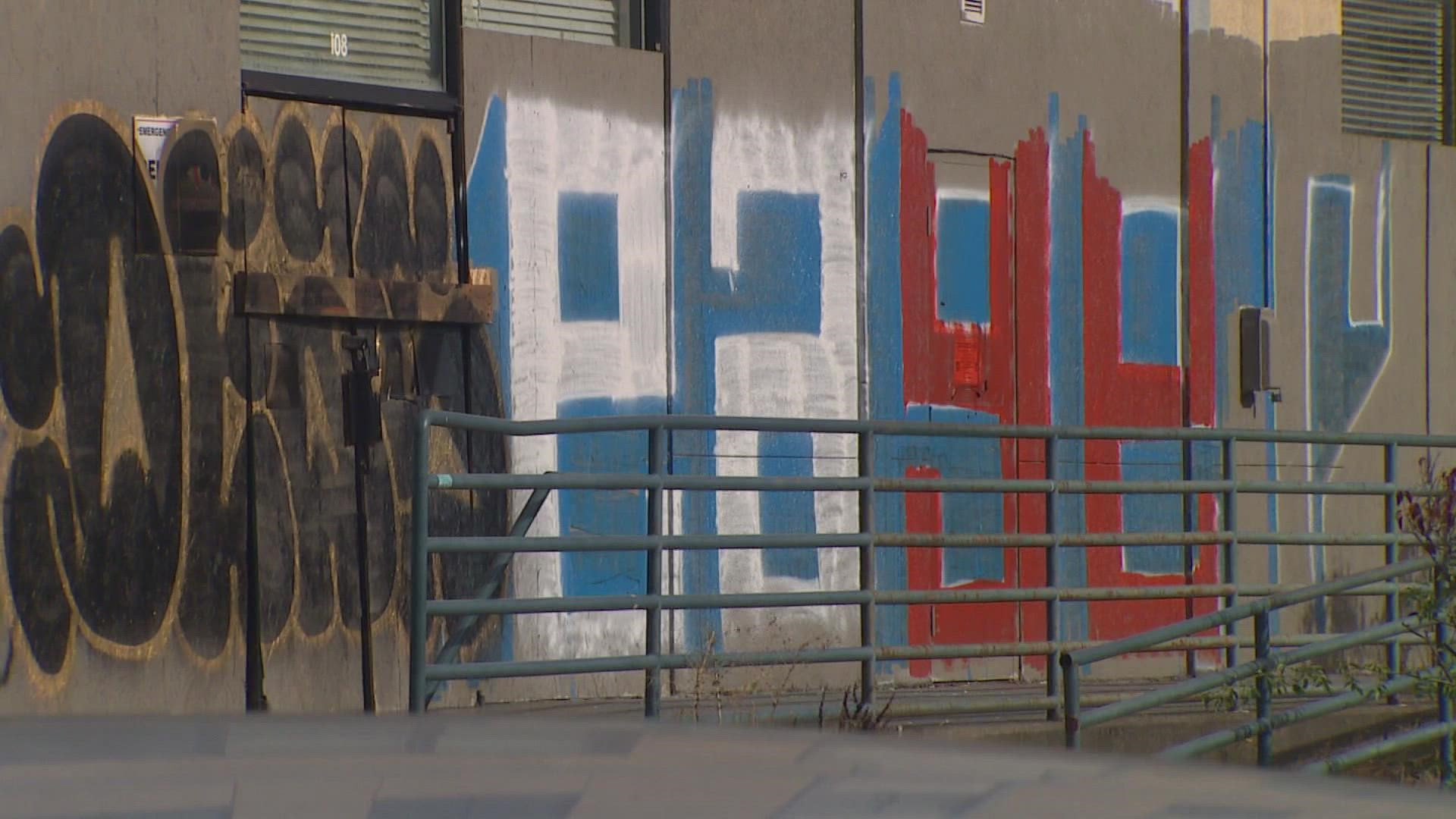SEATTLE — Seattle officers are not allowed to make graffiti-related arrests after a United States District Court judge ruled on Tuesday, siding with four plaintiffs in a lawsuit.
Judge Marsha J. Pechman granted a preliminary injunction to temporarily block enforcement of a section in Seattle's municipal code that deals with graffiti.
Derek Tucson, Robin Snyder, Monsieree de Castro and Erik Moya-Delgado filed a lawsuit in January 2021 after the group was arrested for using sidewalk chalk to write political messages, including some critical of the Seattle Police Department (SPD).
The judge wrote that Tucson wrote "peaceful protest" in charcoal, while the other messages from the other plaintiffs were not identified. SPD officers arrested all four for violating Seattle Municipal Code 12A.08.020. “Property destruction” under the old ordinance was punishable by imprisonment of up to 364 days and a fine of up to $5,000.
In the lawsuit, the plaintiffs alleged that Seattle's ordinance was selectively enforced against them because of the views they expressed. The lawsuit alleged the arrests violated their First and Fourteenth Amendment rights.
The arrests chilled the group's right to engage in further political speech, according to the lawsuit. The plaintiffs believed the ordinance was also "impermissibly vague" and "criminalizes innocent conduct without due process," violating their Fourteenth Amendment rights.
After the lawsuit was filed, the city of Seattle amended the ordinance to take effect on May 13. The new ordinance said that a person is guilty of property destruction if they intentionally damaged property or writes, paints or draws on property owned by another person.
Although the injunction originally blocked all parts of the ordinance, Pechman issued an order Thursday clarifying that the injunction would only apply to the part which pertains to writing, painting or drawing inscriptions.
The Seattle City Attorney's Office said Thursday it would immediately resume charging cases of property destruction.
Pechman wrote that the plaintiffs met four factors to support the injunction, including that they were likely to prove that the graffiti ordinance violates the First and Fourteenth Amendments by being vague and overbroad, have shown irreparable harm by the loss of First Amendment freedoms, the balance of equities favors the plaintiffs and it's in the public interest.
"While Defendants have an interest in protecting against property damage or visual blight, the ordinance is presently so broad as to make any child’s sidewalk art a criminal act," Pechman wrote.
The Seattle Police Department responded on Wednesday to the judges ruling.
"We understand and share the concerns that are being relayed to us by our community, businesses and residents alike," the department said. "We know, as evidenced by the thousands of calls for service we receive each year reporting acts of vandalism and other forms of property damage that property damage is, in fact, a crime that is of significance to community members. SPD is working closely with the Mayor’s Office and City Attorney’s Office to assess next steps with the Court."
People who work near the University District said graffiti is a big problem for Seattle neighborhoods and businesses.
"You're always going after it, trying to clean it off, wipe it down, get rid of it, because it's just going to pile up," said Sikey Vlahos, one of the owners of Voula's Offshore Café near the University District.
Vlahos said graffiti is a constant issue for his café and other businesses in his neighborhood. When he heard that the graffiti law was no longer being enforced, he was concerned.
"If you are graffitiing my building or anybody's building for that matter, and you are damaging the building, you should be responsible," said Vlahos of why enforcement is needed.
Vlahos hopes that the wording of the law can be looked at and that graffiti crimes can be enforced once again.
"We are ruining the image of our city for allowing this to stay up," said Vlahos of the graffiti in Seattle. "And now with this situation, not being able to prosecute them, to pursue, it's gone to the wild west."
The U District Partnership is a neighborhood organization that helps keeps the University District neighborhood vibrant. On a busy month, their crews will clean up around 1,600 graffiti tags.
Don Blakeney with the U District Partnership said that even when the graffiti law was being enforced, they have taken it into their own hands to take down graffiti in the neighborhood.
"It'd be nice if the city had some sort of a superhero team that would come in and investigate who had done what and then go after folks, you know, but they never really have had that capacity," Blakeney said.
The Downtown Seattle Association said in the first five months of the year their Metropolitan Improvement District Downtown Ambassadors have removed more than 20,000 graffiti tags and stickers.

